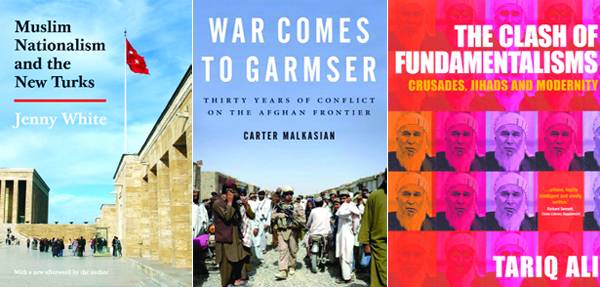
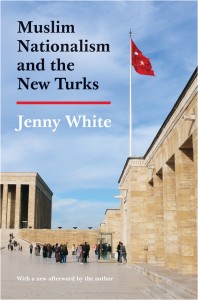
Muslim Nationalism and the New Turks
Jenny White
Princeton (paperback), 2014
PRs 3025
Turkey has leapt to international prominence as an economic and political powerhouse under its elected Muslim government, and is looked on by many as a model for other Muslim countries in the wake of the Arab Spring. In this book, Jenny White reveals how Turkish national identity and the meanings of Islam and secularism have undergone radical changes in today’s Turkey, and asks whether the Turkish model should be viewed as a success story or a cautionary tale. This provocative book traces how Muslim nationalists blur the line between the secular and the Islamic, supporting globalisation and political liberalism, yet remaining mired in authoritarianism, intolerance, and cultural norms hostile to minorities and women.
In a new afterword, White analyses the latest political developments, particularly the mass protests surrounding Gezi Park, their impact on Turkish political culture, and what they mean for the future.

The Convert: A Tale of Exile and Extremism
Deborah Baker
Penguin Books (paperback), 2011
PRs 595
What drives a young woman raised in a postwar New York City suburb to convert to Islam, abandon her country and Jewish faith, and embrace a life of exile in Pakistan? The Convert tells the story of how Margaret Marcus of Larchmont became Maryam Jameelah of Lahore, one of the most trenchant and celebrated voices of Islam’s argument with the West.
A cache of Maryam’s letters to her parents in the archives of the New York Public Library sends the acclaimed biographer Deborah Baker on her own odyssey into the labyrinthine heart of twentieth-century Islam. Casting a shadow over these letters is the mysterious figure of Mawlana Abul Ala Mawdudi, both Maryam’s adoptive father and the man who laid the intellectual foundations for militant Islam.
As she assembles the pieces of a singularly perplexing life, Baker finds herself captive to questions raised by Maryam’s journey. Is her story just another bleak chapter in a so-called clash of civilisations? Or does it signify something else entirely? And then there’s this: is the life depicted in Maryam’s letters home and in her books an honest reflection of the one she lived? Like many compelling and true tales, The Convert is stranger than fiction. It is a gripping account of a life lived on the radical edge and a profound meditation on the cultural conflicts that frustrate mutual understanding.
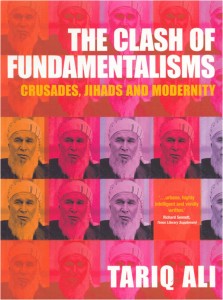
The Clash of Fundamentalisms
Tariq Ali
Verso (paperback), 2003
PRs 395
The aerial attacks on the Pentagon and the World Trade Center, a global spectacle of unprecedented dimensions, generated an enormous volume of commentary. The inviolability of the American mainland, breached for the first time since 1812, led to extravagant proclamations by the pundits. It was a new world-historical turning point. The 21st century, once greeted triumphantly as marking the dawn of a worldwide neo-liberal civilization, suddenly became menaced. The choice presented from the White House and its supporters was to stand shoulder-to-shoulder against terrorism or be damned.
Tariq Ali challenges these assumptions, arguing instead that what we have experienced is the return of history in a horrific form, with religious symbols playing a part on both sides. The visible violence of September 11 was the response to the invisible violence that has been inflicted on countries like Afghanistan, Pakistan, Iraq, Saudi Arabia, Egypt, Palestine and Chechnya. Some of this has been the direct responsibility of the United States and Russia. In this wide-ranging book that provides an explanation for both the rise of Islamic fundamentalism and new forms of Western colonialism, Tariq Ali argues that many of the values proclaimed by the enlightenment retain their relevance, while portrayals of the American empire as a new emancipatory project are misguided.
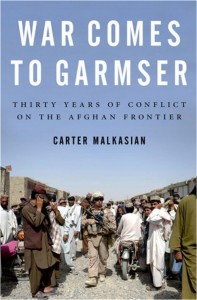
War Comes to Garmster
Carter Malkasian
Hurst and Company (Hardcover), 2013
PRs 3749
If you want to understand Afghanistan, writes Carter Malkasian, you need to understand what has happened on the ground, in the villages and countryside that were on the frontline. These small places are the heart of the war.
Modeled on the classic Vietnam War book, War Comes to Long An, Malkasian’s War Comes to Garmser promises to be a landmark account of the war in Afghanistan. The author, who spent nearly two years in Garmser, a community in war-torn Helmand province, tells the story of this one small place through the jihad, the rise and fall of Taliban regimes, and American and British surge. Based on his conversations with hundreds of Afghans, including government officials, tribal leaders, religious leaders, and over forty Taliban, and drawing on extensive primary source material, Malkasian takes readers into the world of the Afghans. Through their feuds, grievances, beliefs, and way of life, Malkasian shows how the people of Garmser have struggled for three decades through brutal wars and short-lived regimes. Beginning with the victorious but destabilising jihad against the Soviets and the ensuing civil war, he explains how the Taliban movement formed; how, after being routed in 2001, they returned stronger than ever in 2006; and how Afghans, British, and Americans fought with them thereafter. Above all, he describes the lives of Afghans who endured and tried to build some kind of order out of war. While Americans and British came and went, Afghans carried on, year after year.
Afghanistan started out as the good war, the war we fought for the right reasons. Now for many it seems a futile military endeavour, costly and unwinnable. War Comes to Garmser offers a fresh, original perspective on this war, one that will redefine how we look at Afghanistan and at modern war in general.
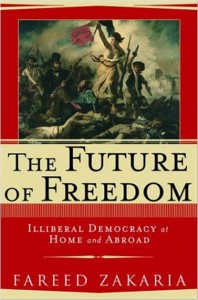
The Future of Freedom
Fareed Zakaria
Norton (hardcover), 2003
PRs 695
Democracy is not inherently good, Zakaria (From Wealth to Power) tells us in his thought-provoking and timely second book. It works in some situations and not others, and needs strong limits to function properly. The editor of Newsweek International and former managing editor of Foreign Affairs takes us on a tour of democracy’s deficiencies, beginning with the reminder that in 1933 Germans elected the Nazis. While most Western governments are both democratic and liberal i.e. characterised by the rule of law, a separation of powers, and the protection of basic rights, the two don’t necessarily go hand in hand. Zakaria praises countries like Singapore, Chile and Mexico for liberalising their economies first and then their political systems, and compares them to other Third World countries “that proclaimed themselves democracies immediately after their independence, while they were poor and unstable, [but] became dictatorships within a decade”. But Zakaria contends that something has also gone wrong with democracy in America, which has descended into “a simple-minded populism that values popularity and openness”. The solution, Zakaria says, is more appointed bodies, like the World Trade Organisation and the US Supreme Court, which are effective precisely because they are insulated from political pressures. Zakaria provides a much-needed intellectual framework for many current foreign policy dilemmas, arguing that the United States should support a liberalising dictator like Pervez Musharraf, be wary of an elected “thug” like Venezuela’s Hugo Chavez and take care to remake Afghanistan and Iraq into societies that are not merely democratic but free.

